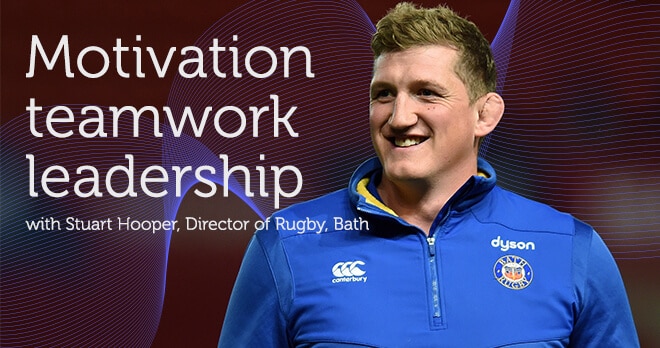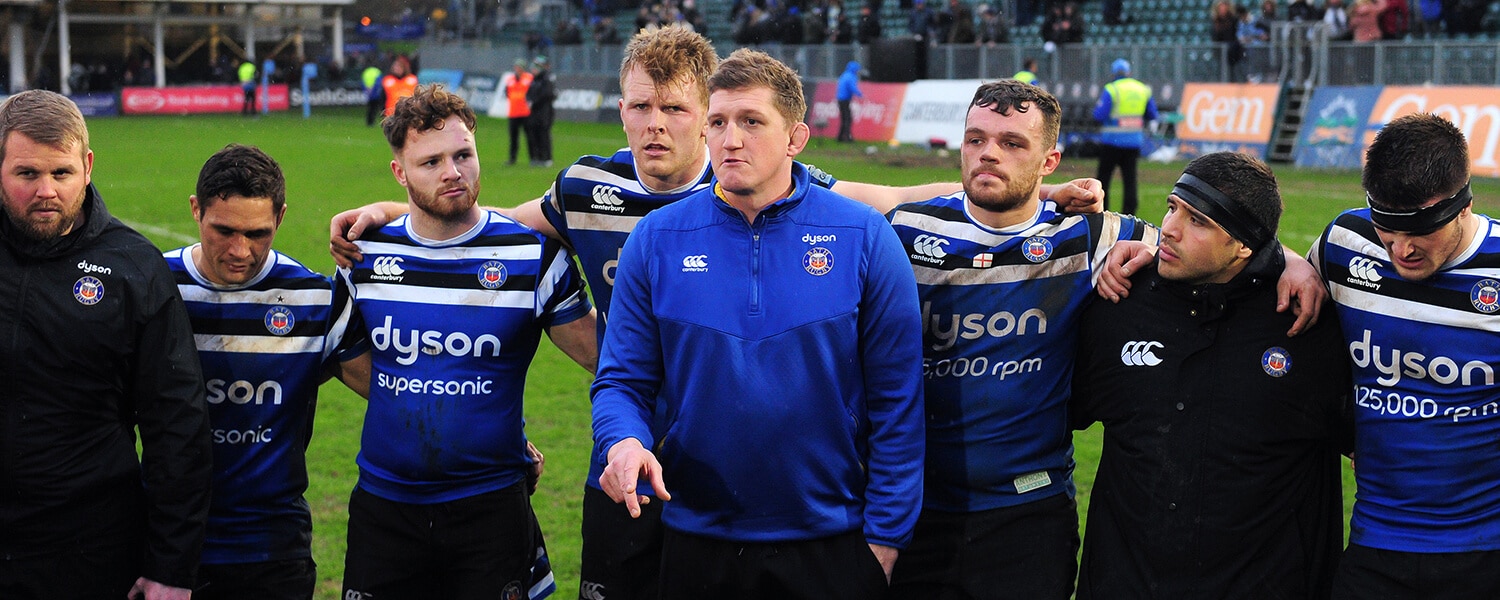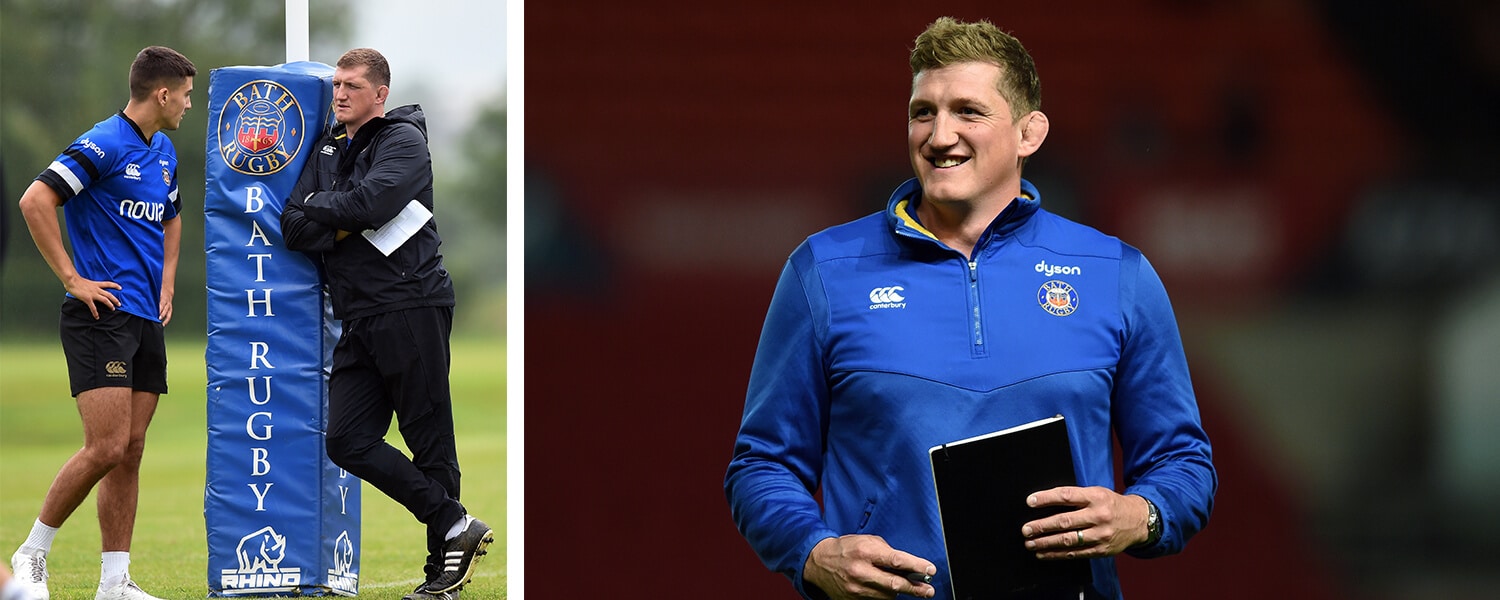Motivation, teamwork and leadership -with Stuart Hooper, Director of Rugby, Bath


RWK: Have there been any particular psychological or motivational coaching techniques which have been important for bringing players back to get them in the zone and regain momentum?
SH: Everyone has been affected by it in one way or another. At the very least, it has disrupted work and life patterns. We’ve had people on furlough, significant wage cuts, the worry of redundancies… an awful lot of unknowns really and that doesn’t even cover the health side of it. People have lost family members or been very sick themselves.
All these things are an experience. The first thing we’re doing with staff and players is how we make sense of that. Before we go back and do anything it’s about being able to talk about the experiences – good and bad. It’s about what good things do you take from this, because there are definitely parts of our working practice which we’ve developed in the time we’ve been away from the Club.
We’ve looked at what are the good bits which we’re taking from the pandemic, what are the bits we found really tough and which bits are we going to need help from each other on to get through it, because it affects everyone in different ways. We’re all human and I believe those experiences shape us and help us to drive towards our goal.
What we felt is if we just let this happen, if we just let people come back to work and carry on, then the chance of everyone benefitting from this terrible situation is actually quite minimal. If we try and talk about it and make sense of it, we can use it.
When we look back on this in five years’ time, we want to be able to say we got better from this rather than “that was a tough couple of months”.

The first stage for us was about sense making individually and then saying “what is our objective for the rest of this season?” So we know we have a period of time when we’ve got nine games plus play-offs, what’s our objective. Normally if you’re in the season, you go from week to week to week and it’s very obvious what you’re trying to do. But because we’ve had this big break, it’s important we do get back in the room and say “our objective is to win the Premiership” and from that we can talk about our strategy and our weekly tactics to do that.
There has to be a moment when someone articulates again what the objective is, what we’ve here for and what are we going to go out and do this year.
"That gave me a lot more perspective and I believe it will make it better at my job as we get back".
We talk about it being a story and the players are in the story and everything they’ve been through during the last 100 days or so is the first part of the story. The second part is actually where we go from here to winning the Premiership at the end of the year. It’s one of the ‘feel’ elements of being a leader or a manager to understand when the time is right for the team to move on and to have some objective markers around that. It’s about moving from that period of sense-making and understanding to ‘where do we head now’.
RWK: What has been the most important leadership skill for you during lockdown?
SH: First, it was a very important time of reflection for me, to look back at what we’ve done and how we could have done it better. Second, it was time for me to reconnect with my family. I have four young sons and my job takes me away from them most of the time. That gave me a lot more perspective and I believe it will make it better at my job as we get back.
I think the skill which has been most important to me through this time is the ability to just continually communicate with people. And to communicate as transparently as possible.
When there’s so much uncertainty, you have to have a human element to your communication. It’s very easy to say “the company is losing lots of money, we’re going to have to make some redundancies”. You need to connect to people at an individual level and understand what that means to them, and communicate with them appropriately.
I think we’re all guilty, in the day-to-day, with feeling that you don’t need to communicate if you don’t have anything to say, but actually during this time because everyone has been at home with time, even if you have nothing to say it’s better to communicate to say “look, there’s no update, there’s nothing happening” rather than just leave a void for people who are off, on their own to fill with whatever they want.

If people are used to working for 40 hours a week, and then they’ve got no contact, then there’s going to be massive anxiety around their future, what they’re doing and even little things like whether the work they’re doing is good.
RWK: What has been going well, or not so well even, with the players’ return?
SH: The big positive has been the physical condition of the players that they came back in. When we first went into lockdown, we managed to get gym equipment to pretty much all of them straight away. Some of the pictures and videos from them are amazing, where they’ve got a weights rack in their sitting room and their sofa has been moved out and a rowing machine has been put in, that sort of thing. They worked incredibly hard on their own and they’ve come back in good condition.
I think the biggest thing we’ve noticed in them is how much they’ve missed the team environment. They missed the opportunity to talk to each other and push each other competitively. They’ve really thrived on the opportunity to come in and run next to someone and make it a race.
It’s the longest time the guys will have been apart from each other. They’re really close, they live in the city, spend a lot of time together. They socialise together and they’re all a similar age. They’re a young group and getting them back together was a huge relief for all of us.
"For me, it’s around vulnerability and opening yourself up. I spent a long time as a player when I was captain just believing that I could do it all and I was invincible".
RWK: How has your support team helped?
SH: Lots of our support team have been on furlough. So we’ve made sure we keep talking to them. As part of the furlough allowances, they are allowed to do professional development. So our coaches in particular have spent time networking with different coaches around the world who are obviously all in similar situations. So they’ve set about some personal projects around areas of the game and around how they develop as coaches. So that’s been a very powerful time for them.
Coming back off furlough, they’ll then share all of their work and their findings with the rest of the group, so that everyone benefits.
RWK: What’s the best bit of advice you ever received on leadership, or a piece of advice which has made you an inspirational leader?
SH: For me, it’s around vulnerability and opening yourself up. I spent a long time as a player when I was captain just believing that I could do it all and I was invincible. Then a number of things happened to me whereby I had to get the help of other people. It was at that point, when I started to open up and let people help me, and show I couldn’t do it all on my own, that I saw the massive merits in developing other people and allowing them to have responsibility.
That for me is the number one thing. If anyone was talking to me about how they can develop as a leader and how they can grow, it would be to actually relinquish some control and give people the opportunity to step up and lead themselves.
"… all the things that are so standard and familiar are going to be different".
It’s hard to do but when you’re forced to do it, like I was, because I had a bad back injury, you get to the point when you need that support. Then you realise it’s so much better because you don’t have all the answers. In order to help give everyone the inspiration and leadership they need you’ve got to let other people in and let them help.
RWK: What’s your biggest challenge for the season ahead?
SH: The uncertainty. We’re in stage two, which is contact training, and stage three is games but we don’t know what that’s going to look like. All the things we normally know are so uncertain, such as travel to the games, hotel accommodation, changing rooms… all the things that are so standard and familiar are going to be different.
So I believe it’s the team that reacts best to those changing and uncertain circumstances which will do the best and that’s certainly our approach.
RWK: How do you see the next five to 10 years?
SH: I do look ahead and try and strategize on what we’re doing. We have a team now who I believe will reach their prime in the next two-three years. These guys will be multiple championship contenders I believe. Whether we win them or not will come down to how it goes on the day but they’ll be there or thereabouts.
I want to be part of that, I want to be growing with this team and leading them to some fantastic memories. That’s as far as I get right now! It’s very much the start, there’s lots of planning and work going in right now to ensure that the next number of years are fruitful for the Club.